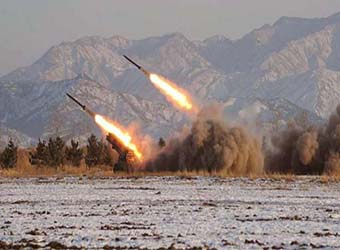North Korea launched on Thursday an unidentified missile that landed in the sea after passing over Japan, the latest escalation as the isolated regime flaunts its nuclear weapon ambitions, according to multiple reports.
The missile was launched from the communist dictatorship’s capital of Pyongyang at about 6:57 a.m. local time Friday headed east, reports said. The projectile passed over Japan before landing in the sea at roughly 7:16 a.m., roughly 2,000 kilometers (about 1,240 miles) east of Japan’s Cape Erimo, according to reports.
South Korea conducted its own missile exercise as Pyongyang fired its missile, taking into account the distance to North Korea’s firing site, according to NBC News.
The United Nations Security Council will meet at 3 p.m. ET on Friday to discuss missile test, diplomats said, at the request of the United States and Japan.
The reports follow North Korea’s test of an alleged hydrogen bomb earlier this month. That test, its sixth and easily its most powerful, prompted fresh, unanimous United Nations Security Council sanctions and stern rhetoric from U.S. President Donald Trump.
In response to the new test, Japan’s Chief Cabinet Secretary Yoshihide Suga told a news conference that it was a provocative action that raises regional tensions. It was also extremely problematic for the safety of aircraft and ships because the missile was fired without advance
notice, he added.
For his part, Japanese Prime Minister Shinzo Abe said that UN sanctions against Pyongyang needed to be firmly imposed, and that the international community must send a clear message to North Korea about its provocative actions.
Another North Korean missile flew over Japan late last month. Thursday’s launch reportedly traveled about 3,700 kilometers (about 2,300 miles) and reached a maximum altitude of 770 kilometers (about 480 miles), traveling farther than last month’s projectile, according to South Korea’s Yonhap.
The international community has tried for years to curb North Korea’s nuclear and missile programs. But Pyongyang continues to test weapons and threaten other countries in the face of international sanctions and warnings.
On Tuesday, Trump called the new sanctions “not a big deal” and “nothing compared to what will have to happen.”
Top U.S. officials have repeatedly said they do not want to take military action against North Korea. But Trump has left the door open to the possible use of force.
The U.S. dollar initially dropped against the safe-haven yen and Swiss franc following the reports, before recovering some of those losses.
The launch “will make markets nervous” heading into the weekend, according to Andrew Brenner, global head of emerging markets and fixed income at National Alliance. If equity markets “stabilize” during Asia’s trading day, the effect could be muted, he added.
Source: Reuters & CNBC


